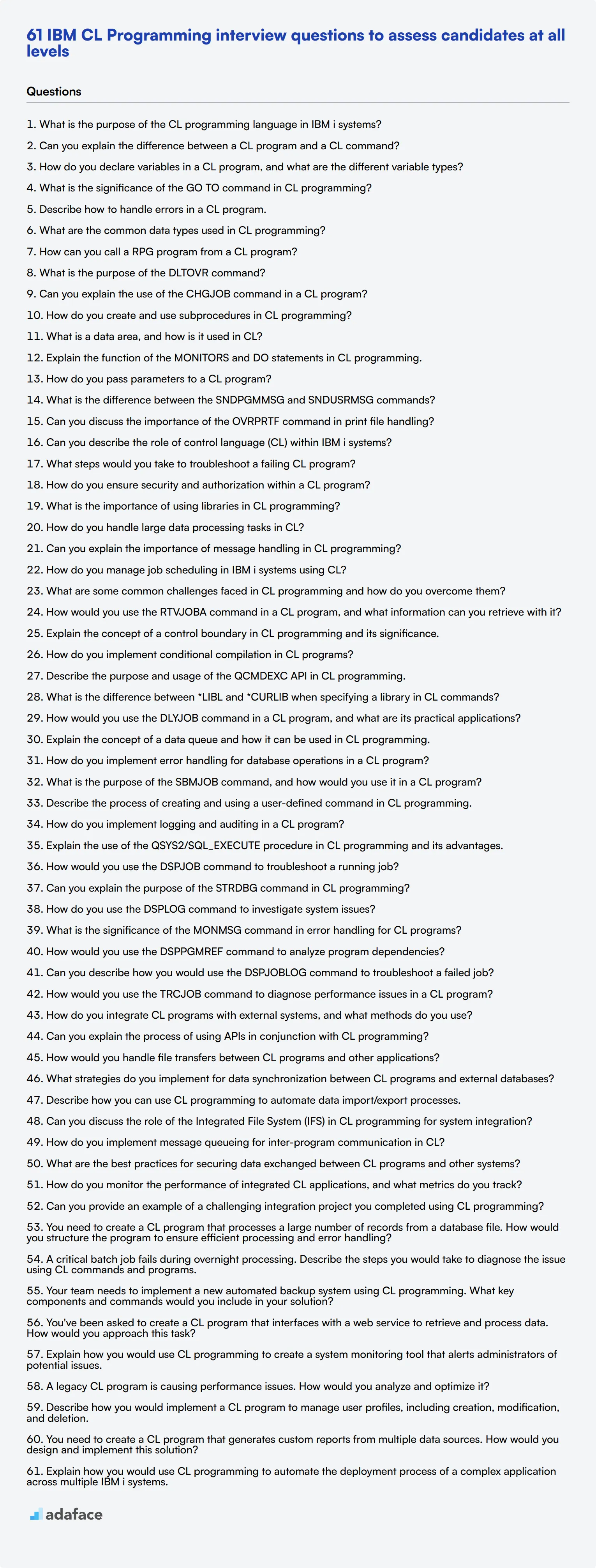Navigating the hiring process for IBM CL Programming roles can be tricky without the right set of questions. These well-crafted questions will aid interviewers in distinguishing top talent from the rest when recruiting candidates.
This blog post covers a range of IBM CL Programming interview questions designed for different experience levels. Interviewers will find questions categorized into basics, junior, intermediate, debugging, system integration, and situational scenarios.
Using this guide, interviewers can effectively assess IBM CL Programming skills and identify the right candidates. Complementing these questions with an IBM AIX online test can streamline the hiring process.
Table of contents
15 basic IBM CL Programming interview questions and answers to assess applicants
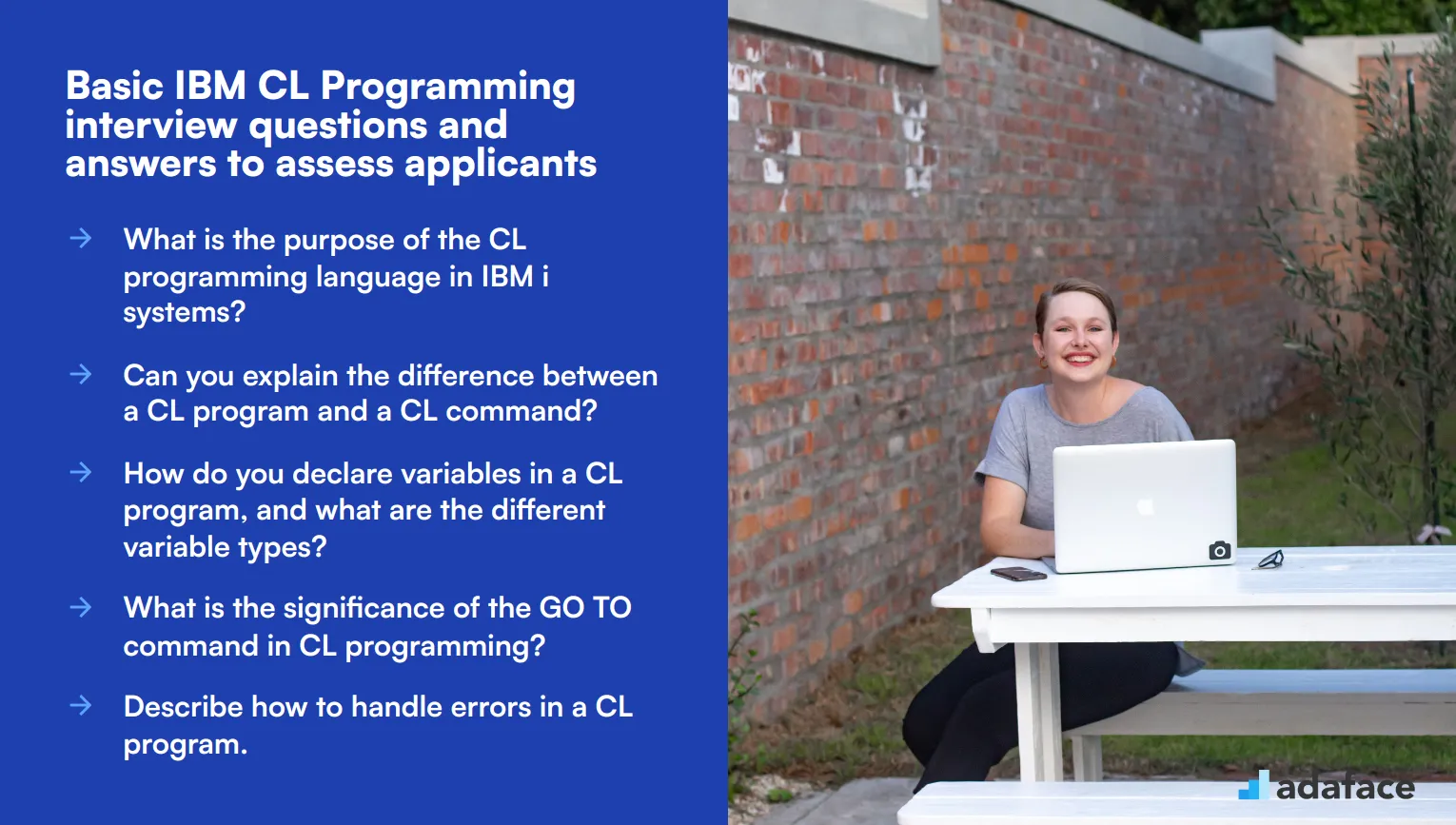
To effectively evaluate candidates for IBM CL programming roles, utilize these basic interview questions to gauge their foundational knowledge and problem-solving abilities. This list serves as a practical guide for hiring managers during interviews, ensuring you select the best talent for your team.
- What is the purpose of the CL programming language in IBM i systems?
- Can you explain the difference between a CL program and a CL command?
- How do you declare variables in a CL program, and what are the different variable types?
- What is the significance of the GO TO command in CL programming?
- Describe how to handle errors in a CL program.
- What are the common data types used in CL programming?
- How can you call a RPG program from a CL program?
- What is the purpose of the DLTOVR command?
- Can you explain the use of the CHGJOB command in a CL program?
- How do you create and use subprocedures in CL programming?
- What is a data area, and how is it used in CL?
- Explain the function of the MONITORS and DO statements in CL programming.
- How do you pass parameters to a CL program?
- What is the difference between the SNDPGMMSG and SNDUSRMSG commands?
- Can you discuss the importance of the OVRPRTF command in print file handling?
8 IBM CL Programming interview questions and answers to evaluate junior programmers
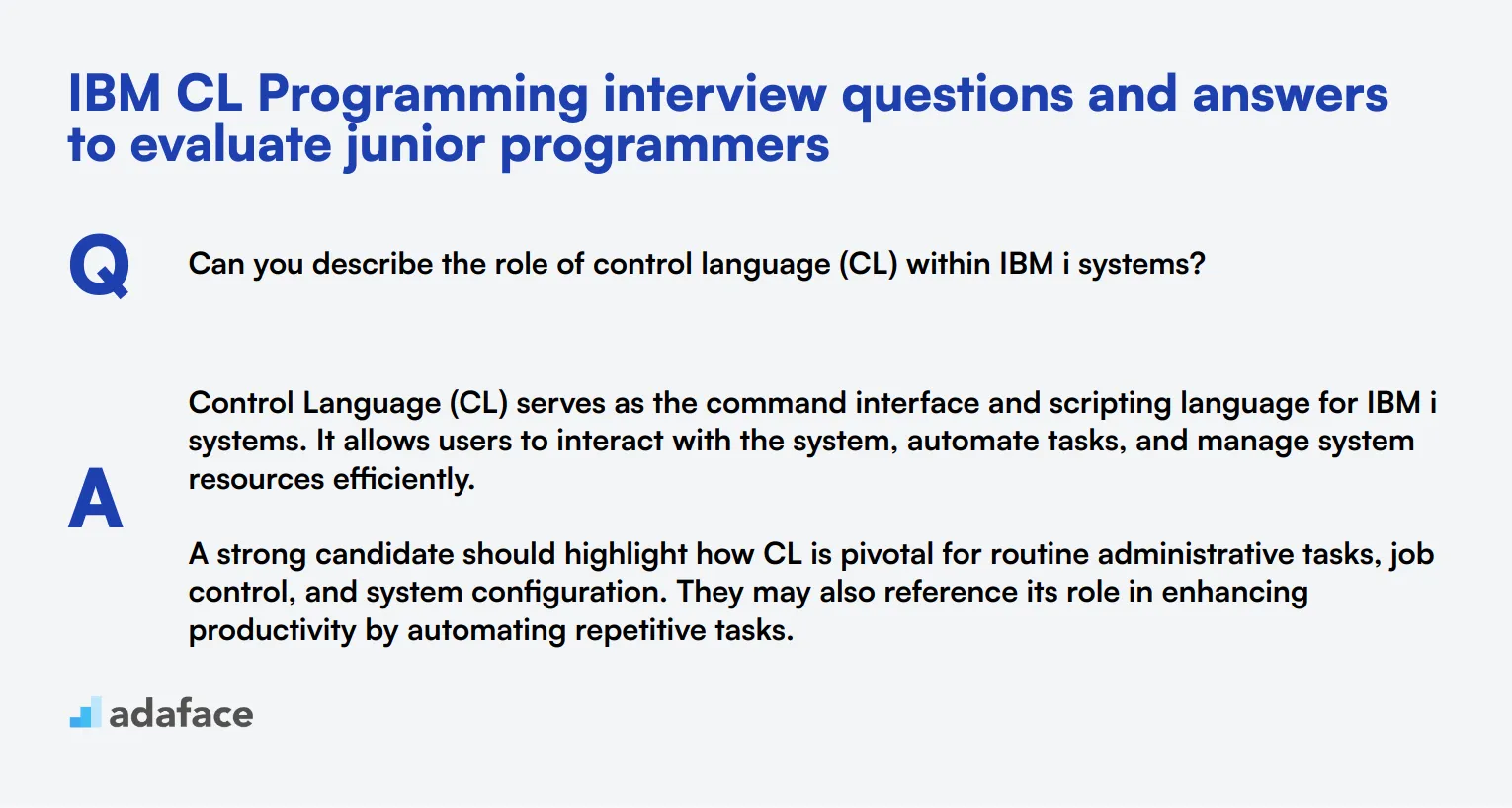
To evaluate junior programmers' familiarity and competence with IBM CL programming, it's essential to ask the right questions. This list will help you gauge their understanding and abilities, ensuring you choose the best candidates for your team.
1. Can you describe the role of control language (CL) within IBM i systems?
Control Language (CL) serves as the command interface and scripting language for IBM i systems. It allows users to interact with the system, automate tasks, and manage system resources efficiently.
A strong candidate should highlight how CL is pivotal for routine administrative tasks, job control, and system configuration. They may also reference its role in enhancing productivity by automating repetitive tasks.
2. What steps would you take to troubleshoot a failing CL program?
To troubleshoot a failing CL program, the first step is to check the job log for any error messages that provide clues about the failure. Reviewing the program's logic and flow control to identify potential issues is also crucial.
Candidates should mention the importance of using debugging tools and techniques, such as inserting diagnostic messages and checking variable values at different points in the program. An ideal response includes systematic steps to isolate and resolve the problem efficiently.
3. How do you ensure security and authorization within a CL program?
Security and authorization in a CL program can be ensured by properly setting up user profiles and authorities. It's essential to use commands like GRTOBJAUT and REVOKE to manage permissions effectively.
Candidates should discuss the importance of adhering to the principle of least privilege, ensuring users have the minimum access necessary to perform their tasks. Look for responses that emphasize maintaining a secure environment while balancing operational needs.
4. What is the importance of using libraries in CL programming?
Libraries in CL programming are essential for organizing and managing resources, such as programs, files, and objects. They help in keeping the system organized and support easier maintenance and scalability.
An ideal candidate would explain how libraries enhance efficiency by grouping related objects and enabling streamlined access control. They should also discuss the role of libraries in ensuring consistency and simplifying backup and recovery processes.
5. How do you handle large data processing tasks in CL?
Handling large data processing tasks in CL involves breaking down the tasks into manageable chunks and using efficient looping and control structures. Utilizing job queues and batch processing can also help manage system resources effectively.
Candidates should highlight the importance of optimizing data access and processing logic to minimize system overhead. Look for responses that demonstrate a clear understanding of performance considerations and resource management.
6. Can you explain the importance of message handling in CL programming?
Message handling in CL programming is crucial for effective communication between programs and users. It helps in error reporting, status updates, and guiding the user through the program's workflow.
An effective answer should cover the use of commands like SNDPGMMSG and RCVMSG for sending and receiving messages. Candidates should also emphasize how proper message handling improves user experience and simplifies debugging.
7. How do you manage job scheduling in IBM i systems using CL?
Job scheduling in IBM i systems can be managed using commands like SBMJOB to submit jobs and WRKJOBSCDE to work with job schedules. It's important to ensure that jobs are scheduled at appropriate times to optimize system performance.
Candidates should discuss strategies for prioritizing jobs, handling dependencies, and managing job queues. Look for answers that demonstrate a solid understanding of effective scheduling practices and resource management.
8. What are some common challenges faced in CL programming and how do you overcome them?
Common challenges in CL programming include managing complex job flows, ensuring data integrity, and handling errors effectively. Overcoming these challenges requires a thorough understanding of the system, careful planning, and the use of robust error-handling techniques.
Candidates should provide examples of specific challenges they've encountered and how they've resolved them. Look for responses that demonstrate problem-solving skills, attention to detail, and a proactive approach to learning and improvement.
12 intermediate IBM CL Programming interview questions and answers to ask mid-tier programmers
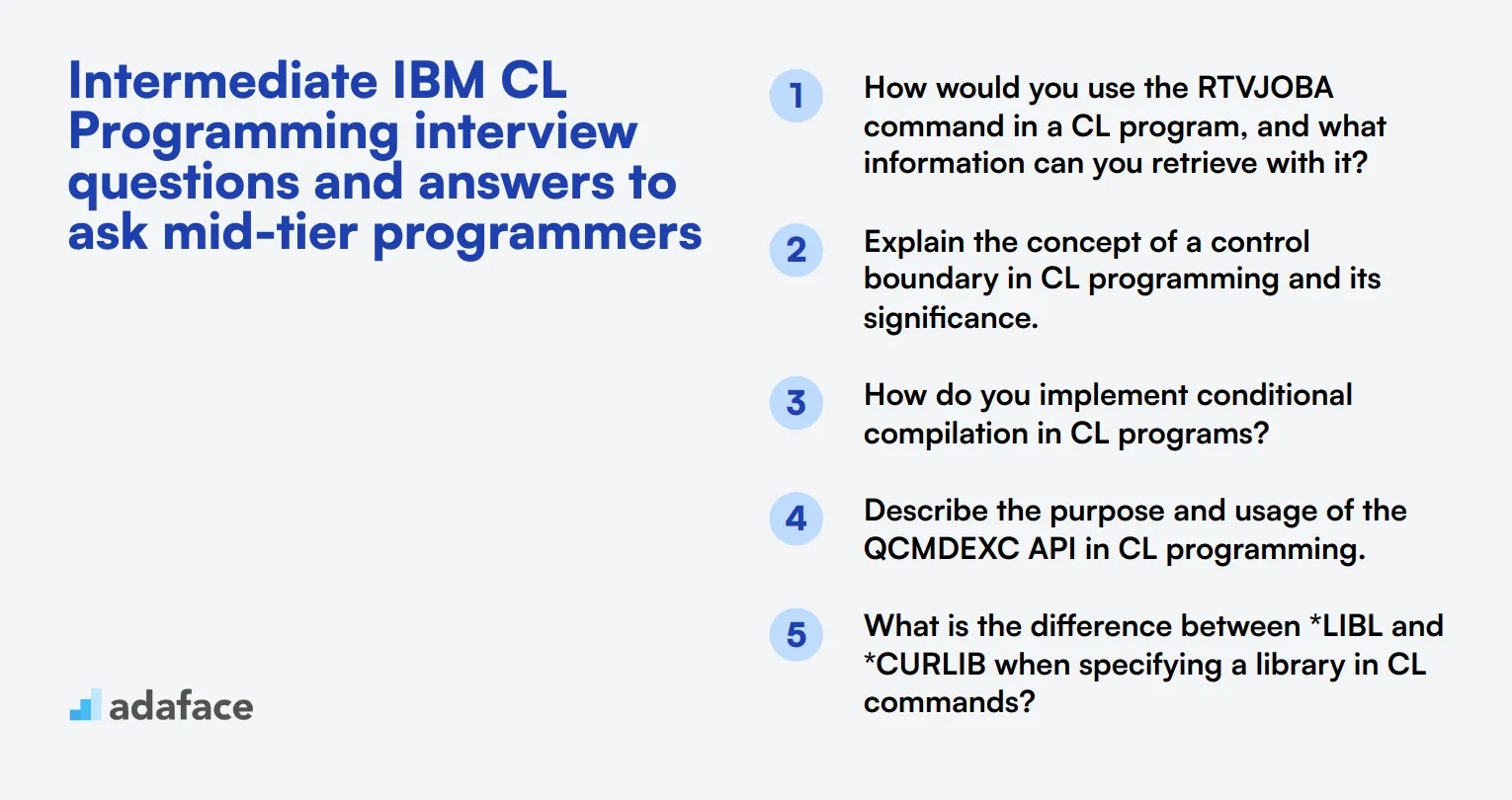
To assess the intermediate-level skills of IBM CL programmers, use these 12 questions during interviews. These questions are designed to evaluate a candidate's practical knowledge and problem-solving abilities in CL programming, helping you identify top talent for your team.
- How would you use the RTVJOBA command in a CL program, and what information can you retrieve with it?
- Explain the concept of a control boundary in CL programming and its significance.
- How do you implement conditional compilation in CL programs?
- Describe the purpose and usage of the QCMDEXC API in CL programming.
- What is the difference between *LIBL and *CURLIB when specifying a library in CL commands?
- How would you use the DLYJOB command in a CL program, and what are its practical applications?
- Explain the concept of a data queue and how it can be used in CL programming.
- How do you implement error handling for database operations in a CL program?
- What is the purpose of the SBMJOB command, and how would you use it in a CL program?
- Describe the process of creating and using a user-defined command in CL programming.
- How do you implement logging and auditing in a CL program?
- Explain the use of the QSYS2/SQL_EXECUTE procedure in CL programming and its advantages.
7 IBM CL Programming interview questions and answers related to debugging and troubleshooting
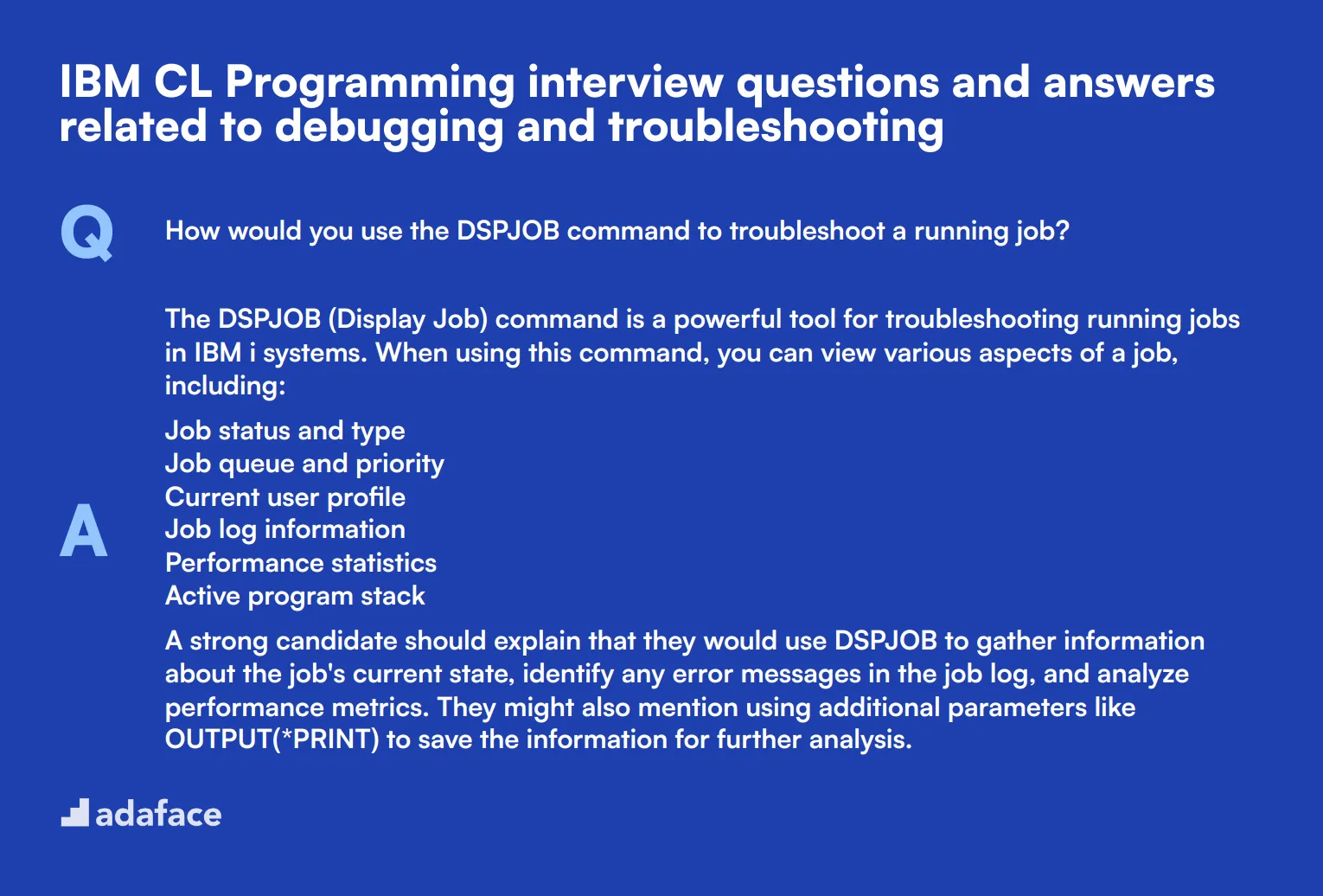
When it comes to debugging and troubleshooting in IBM CL Programming, having the right questions up your sleeve can make all the difference. These seven questions will help you assess a candidate's problem-solving skills and their ability to handle real-world challenges. Use them to uncover how your potential hires approach technical issues and maintain system integrity.
1. How would you use the DSPJOB command to troubleshoot a running job?
The DSPJOB (Display Job) command is a powerful tool for troubleshooting running jobs in IBM i systems. When using this command, you can view various aspects of a job, including:
- Job status and type
- Job queue and priority
- Current user profile
- Job log information
- Performance statistics
- Active program stack
A strong candidate should explain that they would use DSPJOB to gather information about the job's current state, identify any error messages in the job log, and analyze performance metrics. They might also mention using additional parameters like OUTPUT(*PRINT) to save the information for further analysis.
2. Can you explain the purpose of the STRDBG command in CL programming?
The STRDBG (Start Debug) command is used to initiate a debug session for a CL program. Its main purposes include:
- Setting breakpoints at specific lines of code
- Stepping through the program execution line by line
- Examining and modifying variable values during runtime
- Viewing the call stack to understand program flow
Look for candidates who can explain how they would use STRDBG in practical scenarios, such as identifying logic errors or unexpected behavior in a CL program. They should also mention that STRDBG is typically used in conjunction with other debug commands like ENDDBG (End Debug) and ADDBKP (Add Breakpoint).
3. How do you use the DSPLOG command to investigate system issues?
The DSPLOG (Display Log) command is crucial for investigating system-wide issues in IBM i. Candidates should explain that it's used to view the system history log, which contains important information about:
- System startups and shutdowns
- Job starts and ends
- Security-related events
- Hardware and software errors
- Changes to system values
A thorough answer would include mentioning the use of parameters like PERIOD to specify a time range, or MSGID to filter for specific message types. The candidate might also discuss how they correlate events in the system log with application-specific issues to diagnose complex problems.
4. What is the significance of the MONMSG command in error handling for CL programs?
The MONMSG (Monitor Message) command is a critical tool for error handling in CL programming. It allows developers to:
- Monitor for specific error messages or message types
- Specify actions to be taken when monitored messages occur
- Prevent program termination due to unexpected errors
- Implement custom error recovery procedures
An ideal candidate should explain how they use MONMSG in conjunction with other commands like GOTO or CALL to create robust error handling routines. They might also discuss the importance of proper message monitoring to maintain program flow and provide meaningful feedback to users or system administrators.
5. How would you use the DSPPGMREF command to analyze program dependencies?
The DSPPGMREF (Display Program References) command is used to identify dependencies between programs in an IBM i system. When using this command, you can:
- List all objects referenced by a specific program
- Identify programs that call or are called by the target program
- Determine file dependencies
- Analyze the impact of changes to a program or object
A strong candidate should explain how they would use DSPPGMREF to perform impact analysis before making changes to a program or system. They might also mention using the OUTPUT(*OUTFILE) parameter to generate a file for further analysis or automation of dependency checks.
6. Can you describe how you would use the DSPJOBLOG command to troubleshoot a failed job?
The DSPJOBLOG (Display Job Log) command is essential for troubleshooting failed jobs in IBM i systems. When using this command, you can:
- View detailed messages and error codes associated with the job
- Analyze the sequence of events leading to the failure
- Identify specific commands or programs that caused issues
- Determine the exact point of failure in the job's execution
Look for candidates who explain that they would start by identifying the job name or number, then use DSPJOBLOG to examine the job's history. They should mention looking for error messages, unexpected results, or performance issues. A good answer might also include using parameters like PERIOD to focus on specific timeframes or OUTPUT(*OUTFILE) to save the log for further analysis.
7. How would you use the TRCJOB command to diagnose performance issues in a CL program?
The TRCJOB (Trace Job) command is a powerful tool for diagnosing performance issues in CL programs. When using this command, you can:
- Capture detailed information about program execution
- Analyze CPU usage and time spent in different parts of the program
- Identify bottlenecks or inefficient code segments
- Trace database operations and file accesses
A strong candidate should explain that they would start by setting up the trace with appropriate options, run the program, and then analyze the resulting trace data. They might mention using the TRCTYPE parameter to focus on specific aspects like programs, commands, or file operations. Additionally, they should discuss how they interpret the trace results to identify areas for optimization in the CL program.
10 IBM CL Programming interview questions about system integration
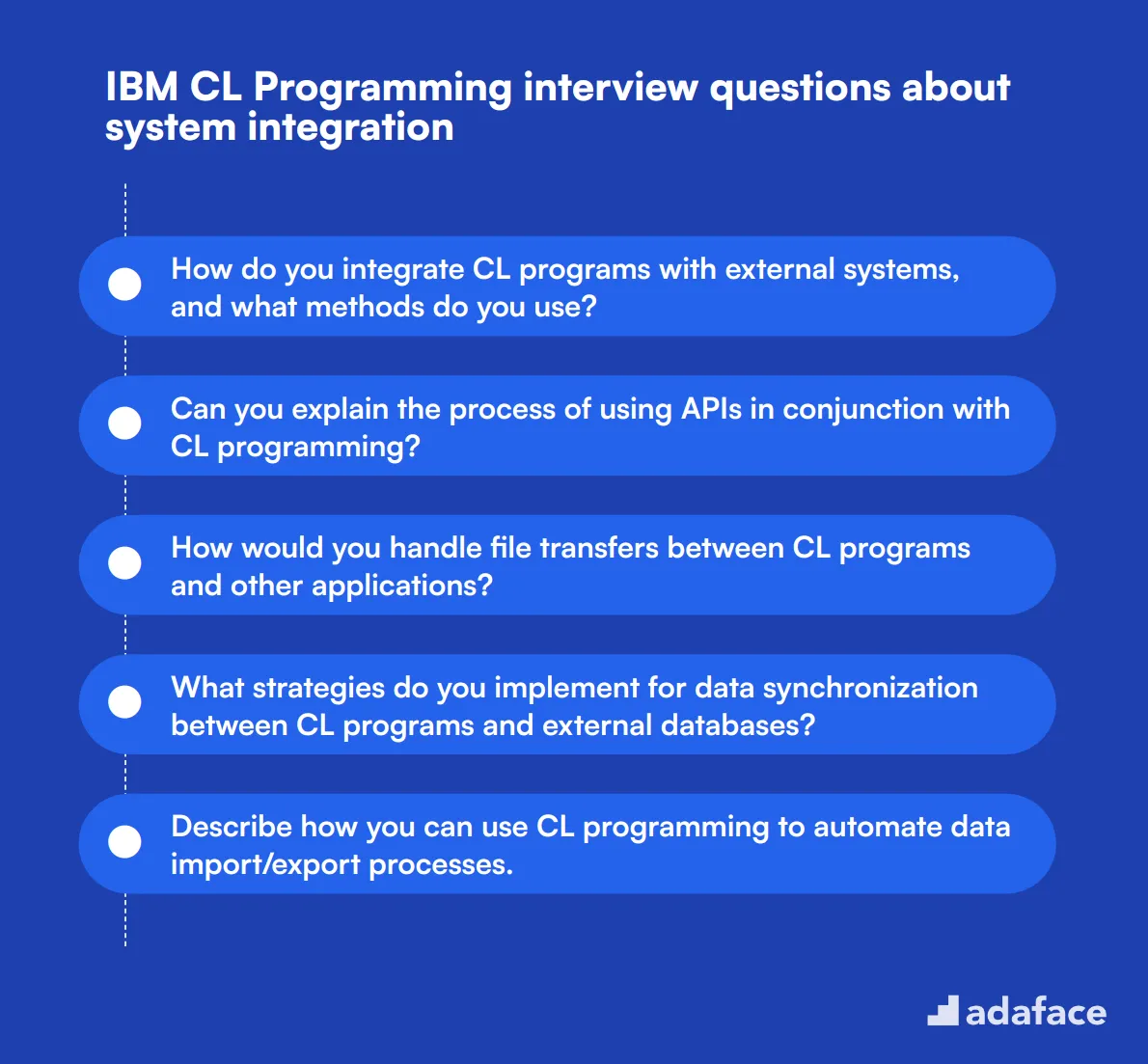
To assess a candidate's abilities in system integration with IBM CL programming, consider using this list of targeted questions. These questions can help you evaluate their practical knowledge and problem-solving skills, ensuring they meet the demands of the role effectively. For more detailed job requirements, you can refer to software developer job description.
- How do you integrate CL programs with external systems, and what methods do you use?
- Can you explain the process of using APIs in conjunction with CL programming?
- How would you handle file transfers between CL programs and other applications?
- What strategies do you implement for data synchronization between CL programs and external databases?
- Describe how you can use CL programming to automate data import/export processes.
- Can you discuss the role of the Integrated File System (IFS) in CL programming for system integration?
- How do you implement message queueing for inter-program communication in CL?
- What are the best practices for securing data exchanged between CL programs and other systems?
- How do you monitor the performance of integrated CL applications, and what metrics do you track?
- Can you provide an example of a challenging integration project you completed using CL programming?
9 situational IBM CL Programming interview questions for hiring top programmers
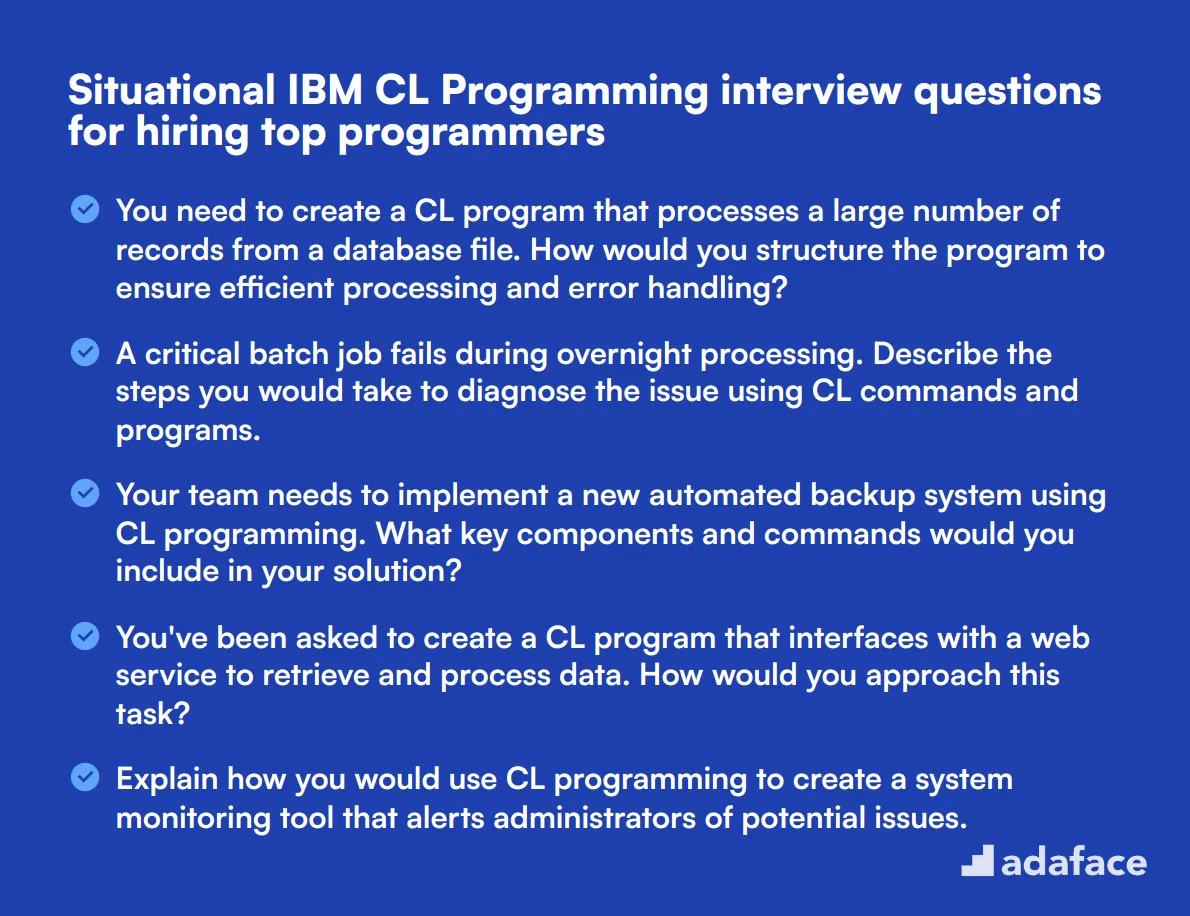
To assess a candidate's practical skills and experience with IBM CL Programming, consider using these situational interview questions. These scenarios will help you evaluate how applicants apply their knowledge to real-world challenges, providing insight into their problem-solving abilities and technical expertise.
- You need to create a CL program that processes a large number of records from a database file. How would you structure the program to ensure efficient processing and error handling?
- A critical batch job fails during overnight processing. Describe the steps you would take to diagnose the issue using CL commands and programs.
- Your team needs to implement a new automated backup system using CL programming. What key components and commands would you include in your solution?
- You've been asked to create a CL program that interfaces with a web service to retrieve and process data. How would you approach this task?
- Explain how you would use CL programming to create a system monitoring tool that alerts administrators of potential issues.
- A legacy CL program is causing performance issues. How would you analyze and optimize it?
- Describe how you would implement a CL program to manage user profiles, including creation, modification, and deletion.
- You need to create a CL program that generates custom reports from multiple data sources. How would you design and implement this solution?
- Explain how you would use CL programming to automate the deployment process of a complex application across multiple IBM i systems.
Which IBM CL Programming skills should you evaluate during the interview phase?
In the context of hiring for IBM CL Programming positions, it's important to recognize that you can't assess every facet of a candidate's capability in a single interview. However, focusing on core skills can provide a well-rounded view of an applicant's proficiency and suitability for the role. Below are essential skills to evaluate during the interview phase.
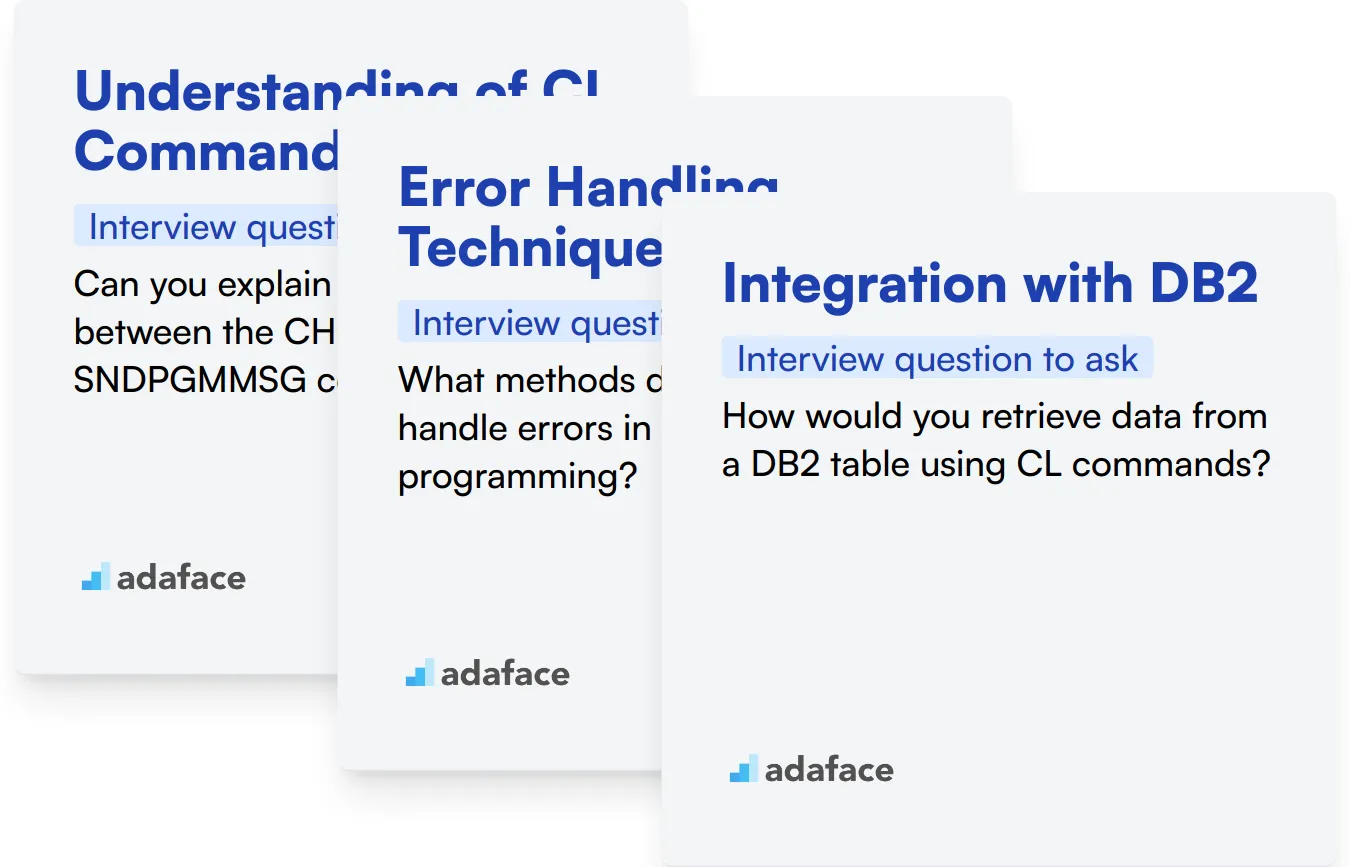
Understanding of CL Commands
To gauge this skill, consider using an assessment test with relevant MCQs. For example, you can utilize our IBM CL Programming test to filter candidates based on their proficiency in CL commands.
Additionally, you can ask targeted interview questions to further evaluate this skill. One effective question to pose is:
Can you explain the difference between the CHGVAR and SNDPGMMSG commands in CL?
When this question is asked, look for clear distinctions between the two commands and practical examples of when each might be used. A strong candidate will not only explain the commands but also demonstrate an understanding of their applications in real-world scenarios.
Error Handling Techniques
An assessment test with relevant MCQs can help identify candidates skilled in error handling techniques. If you're interested, you may want to explore our IBM CL Programming test for this purpose.
As part of your interview, you can inquire about their error handling strategies. One relevant question could be:
What methods do you use to handle errors in CL programming?
When evaluating responses, pay attention to the candidate’s understanding of various error handling methods, such as utilizing the MONITR and ON-ERROR commands. Look for examples that showcase their practical experience in implementing these techniques.
Integration with DB2
To assess this skill, you can implement an MCQ-based test focusing on DB2 integration scenarios. If you're looking for resources, check out our IBM CL Programming test for comprehensive coverage.
You can also present a scenario-based question to assess their practical knowledge. For instance, you might ask:
How would you retrieve data from a DB2 table using CL commands?
When this question is posed, look for thorough explanations of relevant commands used for data retrieval, such as RUNSQL, and their ability to articulate how they would ensure data integrity and performance.
Hire top IBM CL Programming talent with skills tests and targeted interviews
When hiring for IBM CL Programming roles, it's important to verify candidates' skills accurately. This ensures you bring on board programmers who can contribute effectively to your projects from day one.
The most reliable way to assess IBM CL Programming skills is through targeted skills tests. While we don't have a specific IBM CL Programming test, our IBM AIX test and Mainframe test can help evaluate related skills.
After candidates complete these tests, you can shortlist the top performers for interviews. Use the interview questions provided in this post to further evaluate their IBM CL Programming expertise and problem-solving abilities.
Ready to streamline your hiring process for IBM CL programmers? Sign up for Adaface to access our comprehensive test library and assessment platform. Our IT tests cover a wide range of technical skills to help you find the best talent.
IBM AIX Online Test
Download IBM CL Programming interview questions template in multiple formats
IBM CL Programming Interview Questions FAQs
Look for skills in command syntax, program structure, file handling, error handling, and system integration. Experience with IBM i operating system is also valuable.
Ask questions about common debugging techniques, error handling methods, and tools used for troubleshooting CL programs on IBM i systems.
Cover topics like system integration, performance optimization, security considerations, and automation of complex tasks using CL programming.
Ask questions about using CL in job scheduling, system monitoring, and automating routine administrative tasks on IBM i systems.

40 min skill tests.
No trick questions.
Accurate shortlisting.
We make it easy for you to find the best candidates in your pipeline with a 40 min skills test.
Try for freeRelated posts
Free resources




